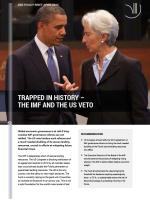Necessary IMF reforms are hindered by US veto
The Spring Meetings in the IMF and the World Bank start on 17 April 2015. Once again, member countries are compelled to discuss ways to overcome the longstanding gridlock in IMF governance reforms. Professor Robert Wade (LSE and DIIS) and Senior Researcher Jakob Vestergaard (DIIS) provide an up-to-date account of the increasingly desperate situation. Global economic governance is at risk, they argue, if long-overdue IMF governance reforms are not ratified. At the end of the day, it is the US veto that hinders these reforms, and the much-needed doubling of the Fund’s secure lending resources, from taking effect:
The IMF is desperately short of secure lending resources. The US Congress is blocking ratification of an agreement reached in 2010 by all member states that would almost double the Fund’s permanent or guaranteed lending resources. The US is the only country with the ability to veto major decisions. The Fund is currently relying on the good will of countries to increase its fire-power in an ad hoc way. This is not a solid foundation for the world’s main lender of last resort to governments.
The IMF is a valuable global public good, because its universalistic membership gives it strong network advantages over more regional or bilateral organizations for supplying the same stabilizing functions. Our study, which builds on five days of intensive interviews at the Fund in February, including with IMF staff and executive directors, shows that the multilateral governance order is at risk if the quota and board reforms, which are already overdue, are not ratified soon.
For the full analysis, download the DIIS policy brief.

